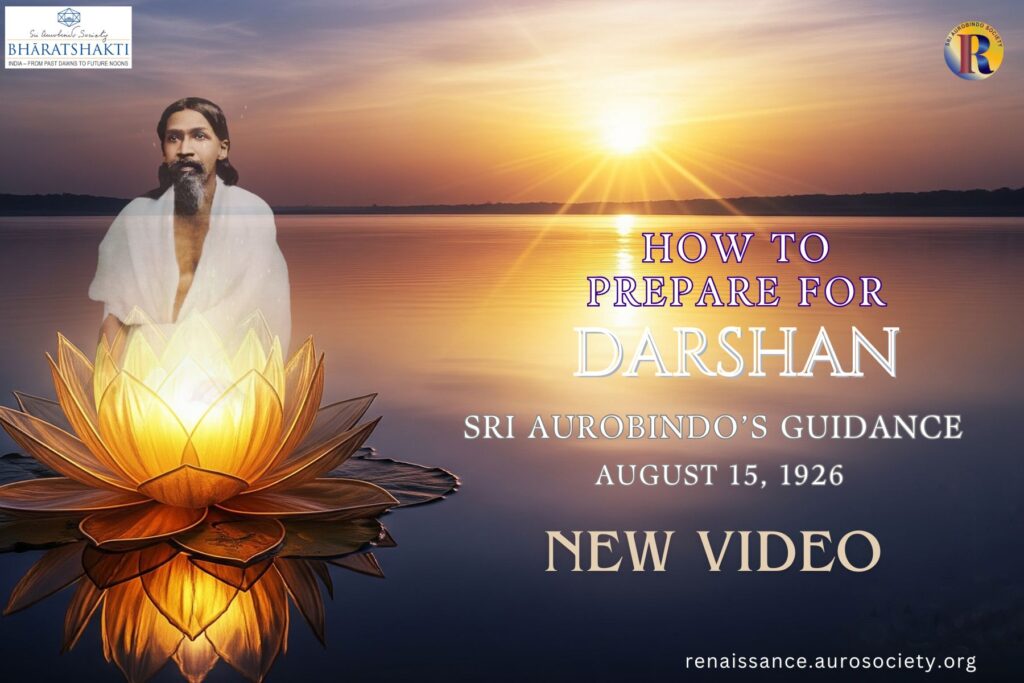Volume V, Issue 6-7
Author: Sri Aurobindo
Editor’s Note: We feature selected letters of Sri Aurobindo which help us understand the value of controlling our urge to indulge in unnecessary talking, especially if we aspire to walk on the path of sadhana. He reminds us that talking often leads to a dispersion of consciousness. But he also emphasizes that instead of observing complete mauna, we must become conscious of our speech, learn to control it, and also practice keeping an inner detached state when speaking.
We also include here a narration of Kahlil Gibran’s poem titled ‘On Talking‘.

Outer Speech and the Inner Life
In talking one has the tendency to come down into a lower and more external consciousness because talking comes from the external mind. But it is impossible to avoid it altogether. What you must do is to learn to get back at once to the inner consciousness—this so long as you are not able to speak always from the inner being or at least with the inner being supporting the action.
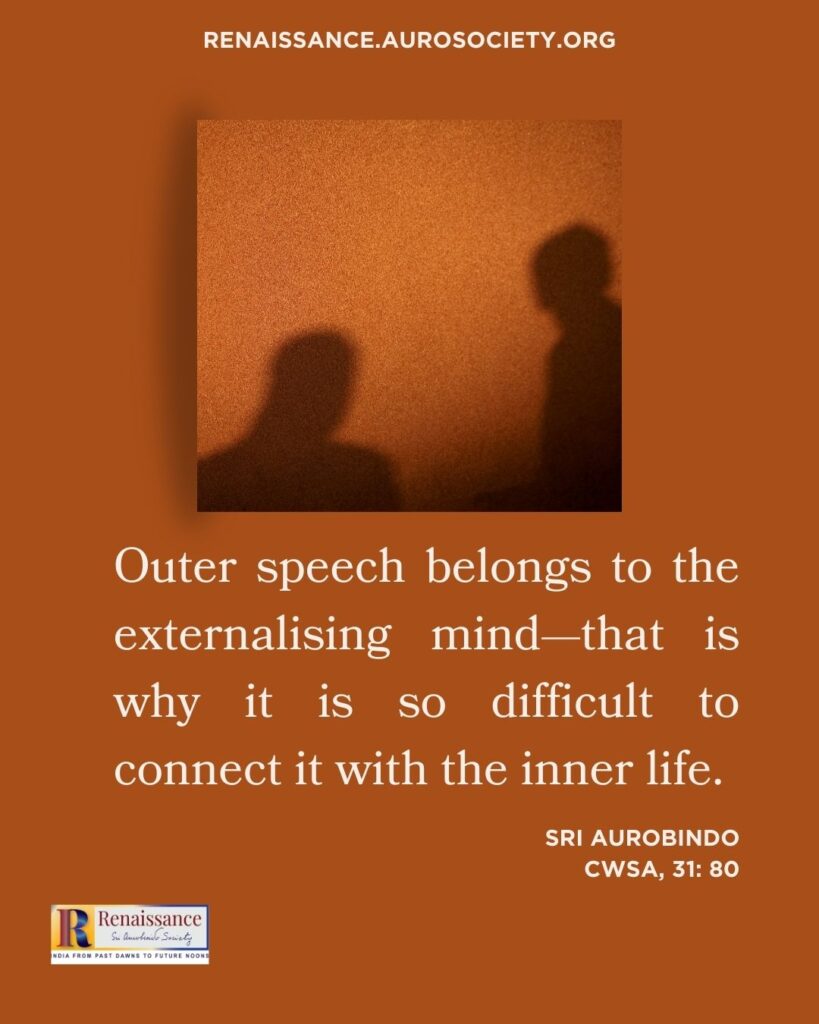
You have to learn not to allow the speaking to alter your condition or else to recover it as soon as the interruption is over.
***
Talking and Dispersion of the Consciousness
There are some who have the flow of speech by nature and those who are very vital cannot do without it. But the latter case (not being able to do without it) is obviously a disability from the spiritual point of view.
There are also certain stages in the sadhana when one has to go inward and silence is at that time very necessary while unnecessary speech becomes a dispersion of the energies or externalises the consciousness. It is especially this chat for chat’s sake tendency that has to be overcome.
***
It [a feeling of dispersion] is of course because the consciousness is thrown out in these things [light talk and laughter] and one comes out of the inner poise and has difficulty in going back to it—especially as there is a sort of dispersion of the vital energy.
If one attains to a condition in which one can do these things only with the surface of the consciousness, keeping inside and observing what is done on the surface, but not forgetting oneself in it, then the poise is not lost. But it is a little difficult to get at this duplication of oneself—one comes to it however in time especially if the inner peace and calm become very intense and durable.
***
[. . .] Talk—of the usual kind—does very easily disperse or bring down the inner condition because it usually comes out of the lower vital and the physical mind only and expresses that part of the consciousness—it has a tendency to externalise the being. That is of course why so many Yogis take refuge in silence.
***
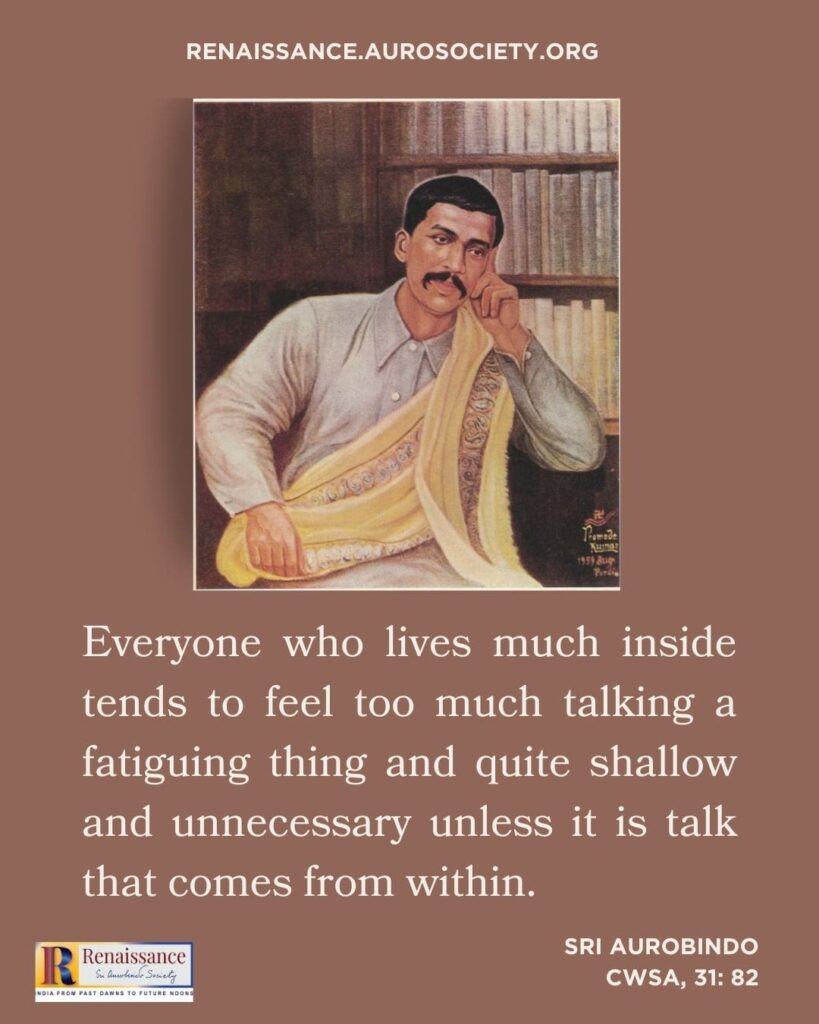
Talking and Fatigue
Everyone who lives much inside tends to feel too much talking a fatiguing thing and quite shallow and unnecessary unless it is talk that comes from within. Of course if you make a practice of talking much, that will bring you outside, externalise you and then you will no longer find it fatiguing even if you talk for 18 hours out of the 24.
***
That [feeling of fatigue after talking] happens very usually. Talking of an unnecessary character tires the inner being because the talk comes from the outer nature while the inner has to supply the energy which it feels squandered away.
***
Chat of that kind [about others] has indeed a very tiring effect when one is at all in the stream of true experience, because it dissipates the energy uselessly and makes the mind movement a thing of valueless shreds and patches instead of gathered and poised in itself so as to receive.
***
The headache and the fatigue is always a sign that the consciousness no longer wants this outward-going thought and speech and is even physically strained by it. But it is the subconscient habit that wants to continue.
Mostly human speech and thought go on mechanically in certain grooves that always repeat themselves and it is not really the mind that controls or dictates them. That is why this habit can go on for some time even after the conscious mind has withdrawn its support and consent and resolved to do otherwise.
But if one perseveres, this subconscious mechanical habit runs down like all machinery that is not kept wound up to go on again. Then one can form the opposite habit in the subconscient of admitting only what the inner being consents to think or speak.
***
Also read:
On Controlling One’s Subconscient and Yoga in the World
Useless, Unnecessary or Light Speech
There should be no useless talking or mere chat, still less anything untrue or prompted by egoism and desire. One can talk, but with silence within and quietude in the speech.
***
[. . .] Useless conversation which lowers the consciousness or brings back something of a past consciousness is better avoided. Talking about sadhana also comes under the category when it is merely mental discussion of a superficial kind.
***
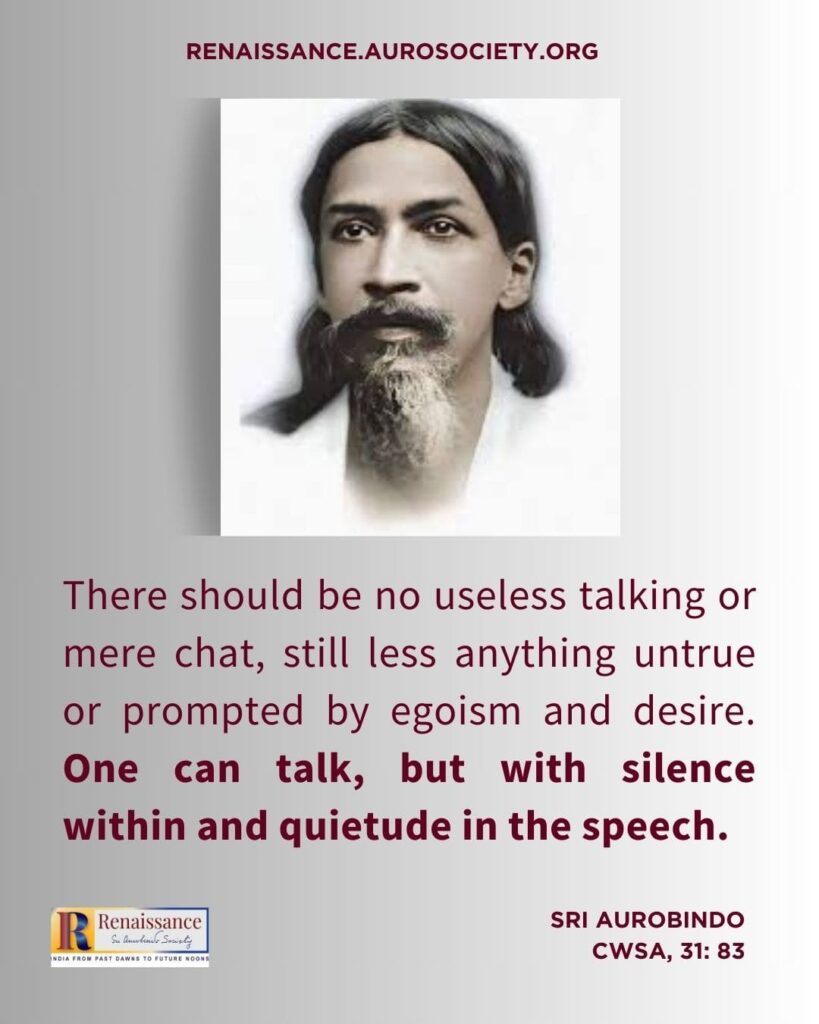
It is true that to indulge in useless or harmful conversations is not good, but on the other hand it is not good to be too much shut up in oneself. Some company and going out of oneself is also necessary.
***
. . . to minimise speech is sure to be helpful both for right action and for inner sadhana.
***
It is something very external that takes pleasure in light talk, and it is only when the quietude and with it a certain spontaneous self-control is established in the lower vital nature that this tendency can be entirely conquered in those who have it—i.e. in most people. [. . .]
***
[. . .] excessive hilarity and unnecessary chat do most undoubtedly dissipate the force. A great moderation is necessary in these things.
***
Control of Speech
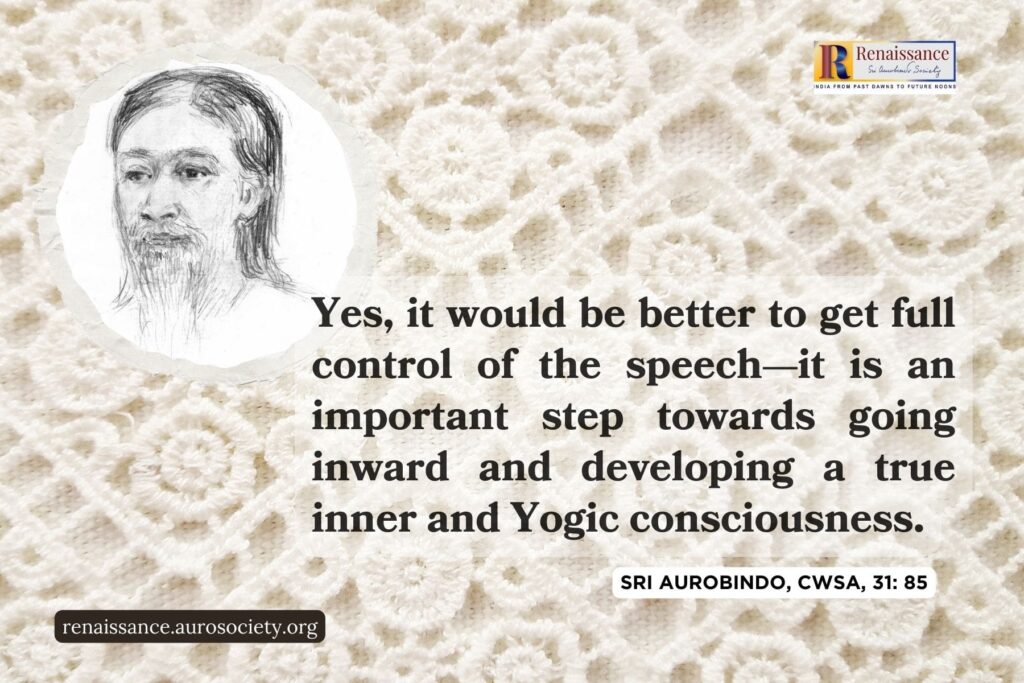
To control speech is to stand back from the speech impulse and observe it, not to say whatever the impulse makes you say but only to speak what one really needs to say or chooses to say, not to speak in haste or anger or impatience or lightly, not to talk at random or say what is harmful. It does not necessarily mean to speak very little, though that is often helpful.
***
It [speech] can only be controlled if you separate yourself from the part that is speaking and are able to observe it. It is the external mind that speaks—one has to watch it from the inner witnessing mind and put a control.
***
Yes, of course, complete truth of speech is very important for the sadhak and a great help for bringing Truth into the consciousness. It is at the same time difficult to bring the speech under control; for people are accustomed to speak what comes to them and not to supervise and control what they say.
There is something mechanical about speech and to bring it to the level of the highest part of the consciousness is never easy. That is one reason why to be sparing in speech is helpful. It helps to a more deliberate control and prevents the tongue from running away with one and doing whatever it likes.
To stand back means to become a witness of one’s own mind and speech, to see them as something separate from oneself and not identify oneself with them. Watching them as a witness, separate from them, one gets to know what they are, how they act and then put a control over them, reject what one does not approve and think and speak only what one feels to be true.
This cannot, of course, be done all at once. It takes time to establish this attitude of separateness, still more time to establish the control. But it can be done by practice and persistence.
***
It is obvious that things which are a long habit cannot go at once. Especially the speech is a thing which in most people is largely automatic and not under their control. It is the vigilance that establishes the control, so one must be on guard against the danger of which you speak, the slacking of the vigilance. Only the more it can be a quiet and unmixed, not an anxious vigilance, the better.
***
The habits of the physical or the vital-physical nature are always the most difficult to change, because their action is automatic and not governed by the mental will and it is therefore difficult for the mental will to control or transform them. You have to persevere and form the habit of control.
If you can succeed in controlling the speech often,—it needs a constant vigilance,—you will finally find that the control extends itself and can in the long run always intervene. This must be done so long as that movement is not fully opened to the Mother’s Light and Force, for if that happens the thing can be done more quickly and sometimes with a great rapidity.
There is also the intervention of the psychic—if the psychic being is sufficiently awake and active to intervene each time you are going to speak at random and say “No”, then the change becomes more easy.
***
The psychic self-control that is desirable in these surroundings and in the midst of discussion would mean among other things:
(1) Not to allow the impulse of speech to assert itself too much or say anything without reflection, but to speak always with a conscious control and only what is necessary and helpful.
(2) To avoid all debate, dispute or too animated discussion and simply say what has to be said and leave it there. There should also be no insistence that you are right and the others wrong, but what is said should only be thrown in as a contribution to the consideration of the truth of the matter. I notice that what you report X as having said in this discussion had its truth and what you said was also true, so that really there should have been no dispute.
(3) To keep the tone of speech and the wording very quiet and calm and uninsistent.
(4) Not to mind at all if others are heated and dispute, but remain quiet and undisturbed and yourself speak only what can help things to be smooth again.
(5) If there is gossip about others and harsh criticism (especially about sadhaks), not to join—for these things are helpful in no way and only lower the consciousness from its higher level.
(6) To avoid all that would hurt or wound others.
***
Mauna or Keeping Silence
That is not the way. Absolute silence and looseness of talk are two extremes; neither is good. I have seen many people practising maunavrata, but afterwards they are just as talkative as before. It is self-mastery you must get.
***
Mauna is seldom of much use. After it is over, the speech starts again as on the old lines. It is in speech itself that the speech must change.
***
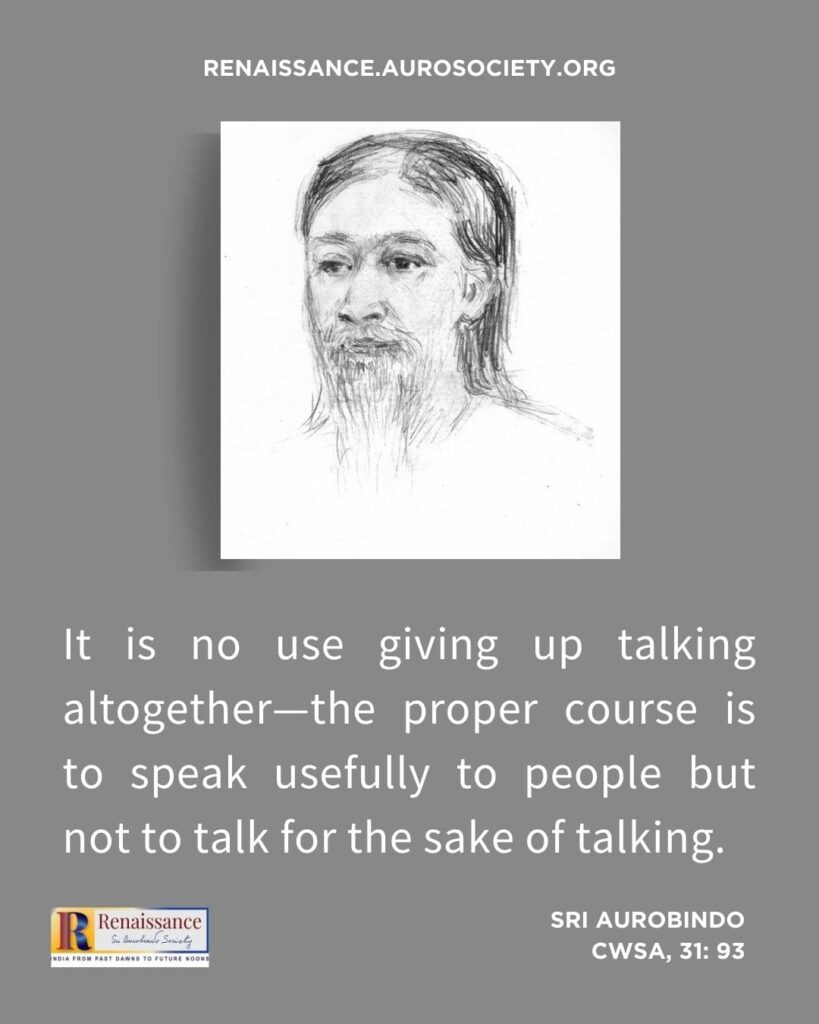
There is not much utility in complete outer silence or absolute retirement. Unless one is very strong spiritually, these things often end by creating a moribund condition of the consciousness.
***
To remain in silence as much as possible is good for a time. But entire retirement is seldom found to be helpful—the lower movements may remain quiescent owing to want of stimulus from outside, but do not disappear. For that you must be able to get an inner quietude and a mastery over the outer movements which will resist any atmosphere.
***
The difficulty is that the things in the atmosphere come in even if one does not speak with people. There are always mind waves moving about. It is a mastery that has to be developed, beginning with a power of silence, exclusion, non-response.
***
It is really an inner silence that is needed—a something silent within that looks at outer talk and action but feels it as something superficial, not as itself and is quite indifferent and untouched by it. It can bring forces to support speech and action or it can stop them by withdrawal or it can let them go on and observe without being involved or moved.
***
If one keeps the inner silence even when among the friends, that is the real thing; the outer silence need only be relative until the time comes when speech itself is an expression out of the silence.
***
If the peace is very strong within, talking does not cloud it—because this peace is not mental or vital even when it pervades the mind and vital—or else it is a cloud that quickly passes without touching deeply. Usually however such talk [about others] disperses the consciousness and one can lose much. The only disadvantage of not talking is that it isolates too much, if it is absolute, but by not talking these things one loses nothing.
~ Sri Aurobindo, CWSA, Vol. 31, pp. 80-94

Listen: On Talking by Kahlil Gibran
Narration: Beloo Mehra
And then a scholar said, Speak of Talking.
And he answered, saying:
You talk when you cease to be at peace with your thoughts;
And when you can no longer dwell in the solitude of your heart you live in your lips, and sound is a diversion and a pastime.
And in much of your talking, thinking is half murdered.
For thought is a bird of space, that in a cage of words may indeed unfold its wings but cannot fly.
There are those among you who seek the talkative through fear of being alone.
The silence of aloneness reveals to their eyes their naked selves and they would escape.
And there are those who talk, and without knowledge or forethought reveal a truth which they themselves do not understand.
And there are those who have the truth within them, but they tell it not in words.
In the bosom of such as these the spirit dwells in rhythmic silence.
When you meet your friend on the roadside or in the market place, let the spirit in you move your lips and direct your tongue.
Let the voice within your voice speak to the ear or his ear;
For his soul will keep the truth of your heart as the taste of the wine is remembered
When the colour is forgotten and the vessel is no more.
From The Prophet (Knopf, 1923)
This poem is in the public domain.

~ Design: Beloo Mehra

